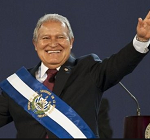Salvador Sanchez Ceren, a leftist ex-guerilla fighter, was sworn in as president of El Salvador on 1 June 2014. During the civil war in the eighties, Ceren was widely known as Comandante Leonel Gonzalez, a commander in Farabundo Marti Front for National Liberation (FMLN), the revolutionary group which waged a fierce armed struggle against the U.S.-backed right-wing oligarchic dictatorship regimes of El Salvador.
Under the peace agreement signed in 1992, the FMLN surrendered weapons, became a legal political party, and embraced the democratic process wholeheartedly. They came to power in 2009 and Ceren won the elections to the Congress three times – 2000, 2003 and 2006. He was also the vice-president from 2009-14.
In the presidential elections held in March this year, Ceren won with 50.11% votes against Norman Quijano, a candidate from the conservative Alianza Republicana Nacionalista (ARENA) party. Quijano secured 49.89%. Quijano had refused to accept the result and even called on the army to intervene. However, the country’s defence minister issued a statement on behalf of the armed forces stating that they respected the outcome. This is the second time that the leftist FMLN has defeated the right-wing ARENA party which stayed in power from 1989 to 2009 without a break.
The El Salvadorean civil war was fought violently between the leftist FMLN and the right-wing dictatorships. More than 75,000 people were said to have been killed, and a million displaced in the bloody war. The armed forces, who were trained by U.S. advisors and paramilitary death squads, massacred thousands of people including peasants, nuns and priests. Among those assassinated was the famous Archbishop Romero who had defended the right of the poor to demand political change, bringing him into conflict with the country’s oligarchy. Even after the civil war ended, the U.S. continued to interfere in El Salvador, with its open opposition to the FMLN and support for the ARENA party.
President Ceren, who survived the war and defeated the dictatorships, now has a tougher battle ahead – this time against crime. El Salvador has one of the highest homicide rates in the world. Criminal gangs have traumatised the country with gruesome murders, drug trafficking and extortion. The two major gangs, Mara Salvatrucha, or MS-13, and Barrio 18 are fighting each other for territorial control, in the bargain killing the many innocents caught in the crossfire. Police, and even football players, have come under attack.
When the disputes between these two gangs turned extremely violent, the government of El Salvador intervened and brokered a truce in 2012. The ceasefire, which has significantly brought down the homicide rate, is holding so far.
Here too, the U.S. has had a role to play. The major gangs trace their roots to U.S. During the war, several hundred thousands of Salvadoreans fled the country and emigrated to America. Today they form the second largest Latino community in the U.S., according to a 2014 report of the Pew Research Centre. Many young immigrants, traumatised by the violence and separated from their families, were easy targets for recruitment by criminal gangs. They have gone to form their own gangs, especially in Los Angeles. The U.S. government deported many of them to El Salvador where they have created a new empire of crime.
Ceren also needs to wage a war against poverty since El Salavador is one of the poorest countries in Latin America. Farbundo Marti, after whom FMLN has been named, fought for the land rights of the indigenous people in the 1930s. He was assassinated and about 30,000 people were massacred by the armed forces in the notorious La Matanza incident of 1932. The dictatorships had done nothing substantial to improve the conditions of the poor. The FNLN government had introduced inclusive development policies in 2009 which Ceren has promised to continue with. He has not proposed any radical Chavez-type revolutionary solutions but has promised to govern in a pragmatic and moderate way, allaying fears regarding his extremist background.
Take his stand on gang violence for instance. During the campaign, Quijano promised to end this by deploying the army. On the other hand Ceren has proposed inclusive social policies to improve employment and educational opportunities – an approach that is compassionate in contrast to the ARENA presidents who practiced ruthless Mano Duro, or Strong Hand policies, which failed. Having been at the receiving end of state-sponsored violence, Ceren is determined to break the vicious cycle. The only constraint is time. Under the Salvadorean constitution, the president is not eligible for consecutive reelection.
In the guise of running an anti-communist campaign, the U.S. intervened, overtly and covertly, in Latin America during the Cold War by supporting right -wing dictatorships. The Left, which was excluded from the political process, was forced underground and resorted to armed struggle. In the last three decades, the tides have changed and the Left has come to power in many parts of Latin America through legitimate means. Ceren is the second leader with a background as a guerrilla fighter to be elected as president after Daniel Ortega of Nicaragua in central America. South America has elected Jose Mujica in Uruguay and Dilma Rouseff in Brazil as presidents. Both are leftist ex–guerrilla fighters. This is a heartening sign of the maturity and inclusiveness of Latin American democracies.
Ambassador Viswanathan is Distinguished Fellow, Latin America Studies, Gateway House. He is the former Indian Ambassador to Argentina, Uruguay, Paraguay and Venezuela, and Consul General in Sao Paulo.
This blog was exclusively written for Gateway House: Indian Council on Global Relations. You can read more exclusive content here.
For interview requests with the author, or for permission to republish, please contact outreach@gatewayhouse.in.
© Copyright 2014 Gateway House: Indian Council on Global Relations. All rights reserved. Any unauthorized copying or reproduction is strictly prohibited


